Humble Beginnings at The Improv with Larry David
Comedian Larry David discovered his now legendary Seinfeld-ish shtick through his humble beginnings at the famous New York City comedy club The Improv.
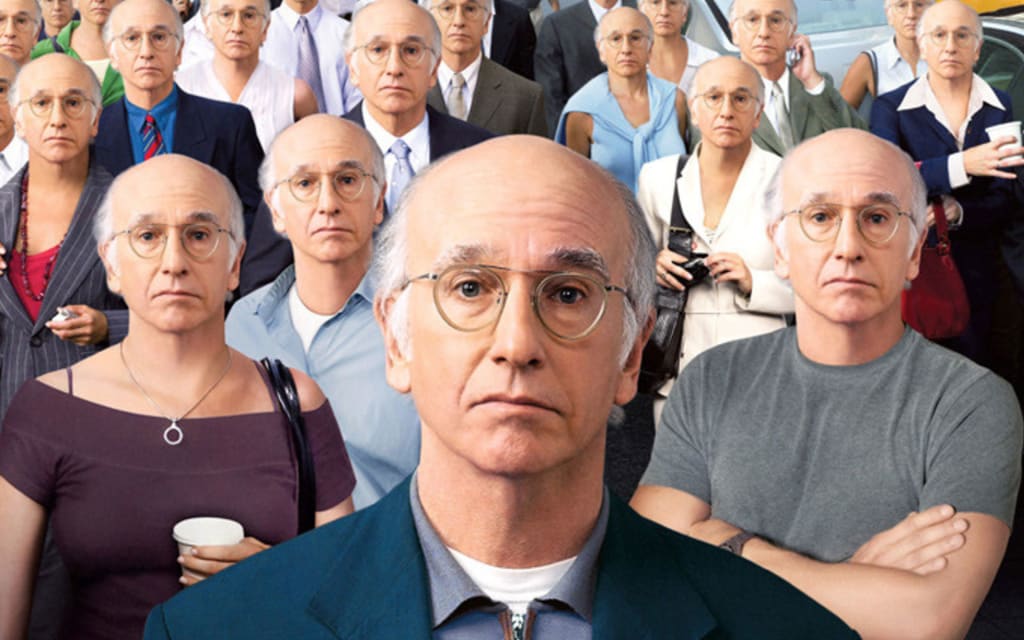
Larry David looks out at a packed house through thick aviator glasses. Catching the audience off guard, he speaks slowly, in a voice vaguely reminiscent of Jackie Mason. "Well, I've done it again I've driven another woman to lesbianism...." The line registers, and laughter fills the room. He's already got the crowd hooked, one of the first things a stand-up comic must learn.
Extending one crablike hand, David segues expertly, continuing his monologue. "Lying has always come in handy to me," he says, "particularly when I was in the Army. I used to make up religious holidays to get out of work. I'm sorry drill sergeant," he barks as he salutes, "I can't take K. P. tomorrow-it's a big Jewish holiday-it's called Chuckukous Yes, we dip our elbows in black cherry soda....It's in memory of the founding of the Kirsch beverage company." The timing's perfect.
The phrases flow in staccato bursts now, like missiles fired off in succession. 'Samoans are among the most interesting people in the world-mainly because they're not people. They're pancakes Samoans are pancakes they're made out of flour and batter-you can go up to a Samoan and take a bite out of his head. They're delicious-they have a very high body temperature, like 108 degrees-butter melts on their heads, it drips down-they sit in your stomach for days. The whole Island of Samoa worships Aunt Jemimah-she's a religious goddess over there. She has quotes all over the Island-'Eat Your Pancakes, Motherfucker. Let me give you a little tip-if you're ever in Samoa, don't call any of them a flapjack-it's a racial slur-they're pancakes and they want to be called pancakes!'
David presses on but he loses his rhythm and eventually the audience. The jokes draw scattered laughs; people in the audience begin chatting. 'Okay, now, I forgot the rest of my act,' he stammers, 'uh, I'm going back to the bar to study-up and I'll be back next week thank you.'
So ends one of the acts on a typical Saturday night at The Improvisation, 44th St and Ninth Ave in New York, the granddaddy of showcase nightclubs, the premiere farm club of aspiring Jewish Jazzmen. The club is located in Hell's Kitchen, a carnival scene out of a Fellini flick. Street hustlers with pushcarts, loose joints and fast women are catering to the crews of Op-Sail and early Democratic conventioneers. This small club nestled in this bizarre neighborhood has been home for Richard Pryor, Dick Cavett, Freddie Prinze, Bette Midler, Robert Klein, Jimmie (J. J.) Walker, Rodney Dangerfield, Liz Torres, Gabe Kaplan and Lily Tomlin at one time or another. They worked out here when they were scuffling in show business; all were discovered here.
"Sure, it's you up there, it's lock, stock and barrel you. It's your material, your ego, your flesh, your perceptions. It's not like a painting where you paint it and walk away from it while people insult it or reject it. You're taking the insults and the rejection. In the beginning especially, it's very difficult. It's depressing. This is my work, my art-and when my art does not go well it effects my being."
"The desire you need to do it has to be as strong as anything you've ever encountered. If your degree of desire is anything less than that-you don't do it."
Our conversation shifts to other performers. "Larry David's going to be another Woody Allen or better in a few years, he says. Rick Newman, owner of Catch, agrees and explains the dilemmas David may face until he "makes it.' "Larry is very different, a total individual,' he says. "It may take him longer to develop but once you're successful and recognized as being different-it works for you 10 times over.'
David's still paying dues. I saw an audience attack him late one night. It happens to people on all levels of the spectrum, usually early in the morning when drunks eat the novices like hungry sharks. It's ugly and depressing and every time I see it happen, I wonder about the defenses a performer needs to protect himself. I consoled David after his debacle-that crowd would have lynched Johnny Caron.
"No," he told me, sitting at the bar, doodling furiously on a cocktail napkin. "I wasn't funny, I didn't feel funny and I couldn't grab them up front. If you don't know what you're doing up there, they sense it. I'm the one who's supposed to be in charge and I'm responsible for the reSults.
"I'll tell you something, though," he added, raising his voice in anger. I don't have to give a shit-I don't get paid here. If I do a bad show, a bunch of bad shows, what the fuck? I had it down when I went through my act in my apartment this afternoon, and I just didn't have it tonight. I'm a professional, I'll be back tomorrow night and every fucking night, if I have to, until I get it right.
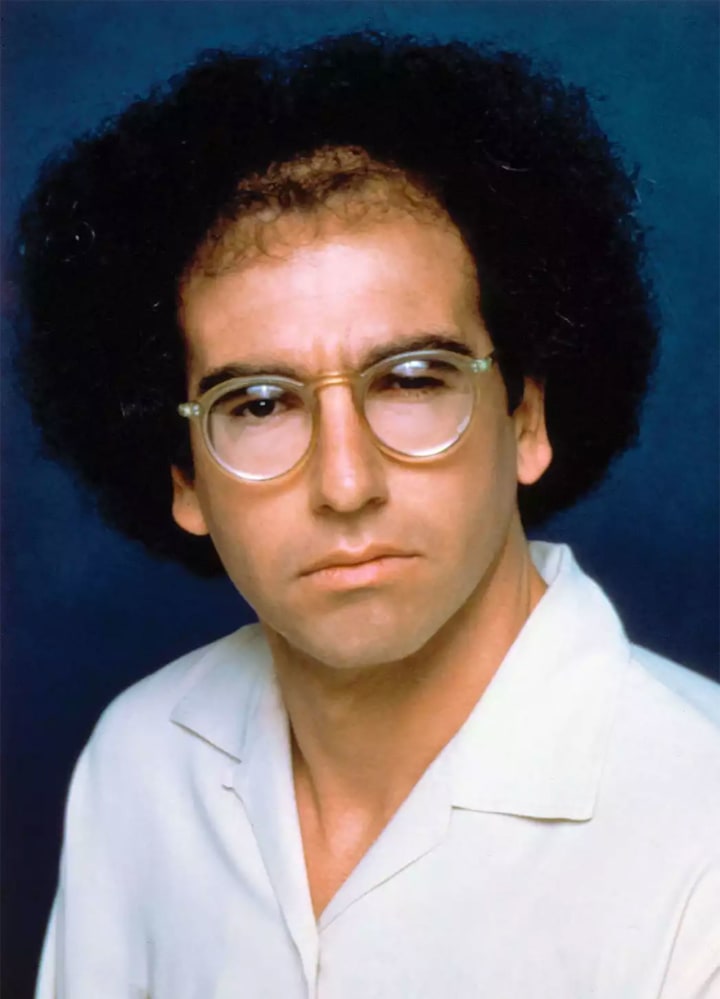
Larry David, c. 1970's
Yet for every Robert Klein success story there are a dozen failures, performers who'll never make it as far as the Joe Franklin Show. The real dreamers play the clubs on Audition Nights, waiting their turn on a list of 30 or 40 acts to do their six minutes and hope to be noticed and asked back to work some time late at night. You'll see teachers, clerks, secretaries, executives and the unemployed actors. They bring families and friends along, and audiences are often composed of these supportive people who try and help them on before the comic they came to see. Paying customers on zoo nights are looking for a good old fashioned give-this-guy-the-hook good time.
Comics like Maurice and Joslyn Morgan, a high school student and the youngest comic on the scene, are like Double A rookies hoping to pinch hit with two out in the bottom of the ninth and their team losing 8-0. They've been through the audition stage and they work regularly at the Improv. After 1 a.m. In an article called "Monkey Wrenches And Morning Sets' in Laff Maker News, Maurice talks about early morning dues. "Some of us get discouraged when it's our turn to go up and it's 3:30 in the morning and there's four or five people in the audience. Long as it's people out there, you have a show. If you can go up at this hour and still make a small crowd laugh, you're a comedian.' These performers are hungry, they believe that somehow, they can turn a hostile audience around. The comics fight to get on, no matter how late, and they even slip their names on the audition list to get in an eXtra Sct.
Maurice has received his share of what one bombing comic calls a "reverse standing ovation.' No matter how aggressive the audience is, or how fast they are leaving, Maurice hangs on. When that's not good enough, his lack of experience causes him to panic, and Maurice will do or say just about anything to get a laugh. "Hi, I'm a darkie,' he tells one particularly rough audience. Then he moves to the piano and gets into "Song Lyrics For The Bicentennial." "Karen Quinlan,' he says, banging on the keys, "what a difference a day makes. Sammy Davis Jr.-can't take my eye off of you,' he sings out of key. "Linda Lovelace-I took the blows and did it my way. Thank you for leaving,' he says to a few patrons making a rapid exit. "You didn't like the songs, huh? Well, I don't give a shit.' He tries a political joke before splitting. "Where does Jimmy Carter stand with the Jews? At the Bagel Nosh.' Maurice will be back tomorrow night at the Improv to have another go.
“I’ll be back tomorrow night and every fucking night until I get it right'
The success of the showcase concept, invented at the Improv, inspired two uptown competitors, Rick Newman's Catch A Rising Star and The Comic Strip. Catch puts on the slickest show (only the best get to play there), while The Comic Strip, open since June, relies on less experienced performers, a notch below the talent playing at the other two clubs. All three are filled on Friday and Saturday nights. Showcase clubs are popping up everywhere and are becoming an increasingly important facet of show business.
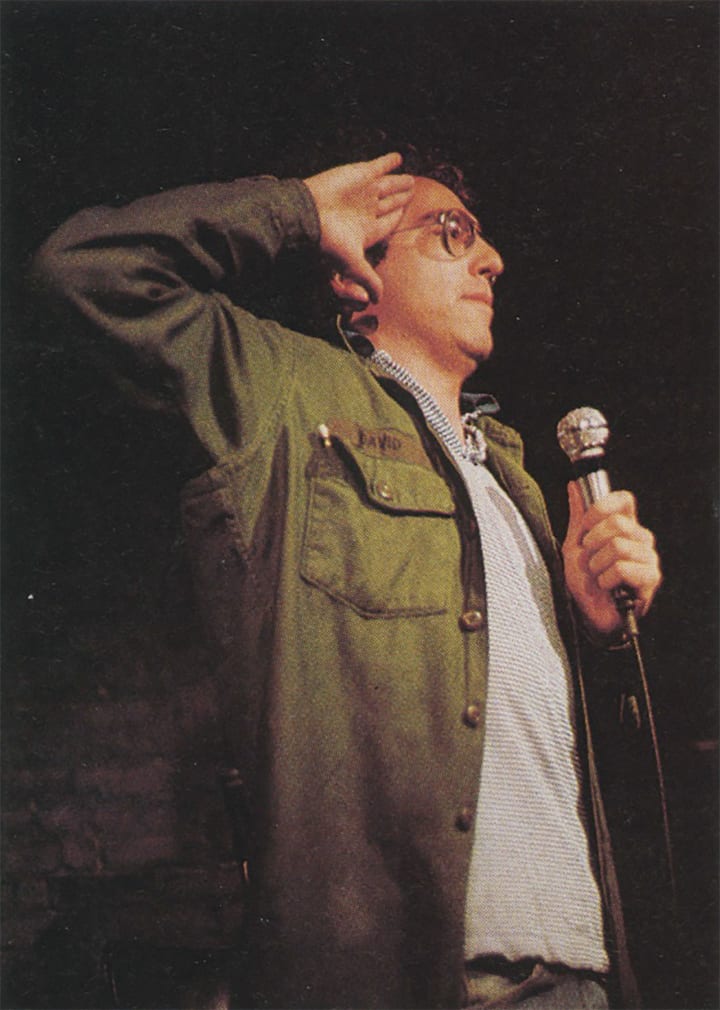
Larry David salutes crowd at The Improv, c. 1970's
The Improv, where it all began, was not always a workshop and launching pad for young comedians. It got that way almost by accident. In early Spring of 1963, Budd Friedman, a disillusioned adman who was thinking of opening a pet-shop, escaped into the restaurant business instead. He did it because his wife, Silver Saunders, was in ''How To Succeed in Business Without Really Trying” at the time, and she and the cast were looking for a place a little less expensive than Sardi's to hang out after Broadway-show closing time. Thus was born the Improvisation. At Budd's the young actors got on stage and sang, did comedy improvs and free-form comedy. Soon the word got around that this funky little store-front-hole-in-the-wall in the bowels of New York was a place a young performer could break in an act and get On Stage.
Eventually, Friedman shaped the place into a relatively stable nightclub structure, one that eventually made him a potentate on this circuit. He emceed many of the shows himself and personally arranged the program from the talent pool, swapping jokes and stores in the bar. Like a good coach, Budd offered suggestions, consolation on a bad night, and a good meal to hungry performers. A comic's reward for a good set would be a prime spot on a Saturday night, early enough to work before a full house. As each generation of comics blossomed and entered the mainstream of the business, a new wave filled the void. Guest sets by famous alumni (who sometimes test new material) also helped the Improv through its more difficult transition periods.
While Friedman gets the credit for developing the most popular comic spawning ground, he also has to deal with the most controversial aspect of the arrangement: only the emcee and the house pianist-none of the comics-get paid. To anyone outside show business, this looks like a classic example of artistic exploitation. But none of the comics on the scene that I spoke with felt ripped-off. Ed Bluestone, a six-year veteran at the age of 27 and perhaps the most advanced
of the group, has paid his dues and thinks the issue's blown out of proportion. He smiled when I asked him what he thought of the clubs not paying talent.
"Almost every interview I get asked that,’ (he's been interviewed about 100 times), he said in a unique voice that's kind of like listening to Arnold Stang at a slow speed. "It's not such a big deal to me that people don't get paid because any place you go to work on the road the headliner's going to get $4,000 for three nights and you're going to get $200. To me there's not that much difference.”
"The club owners are giving you a place to work out,' explains Bob Shaw, "and they're making their bread. In the future, I'll make my bread. This is my workshop, I can come in here and do anything I want within a certain amount Oftaste.”
"If we paid the talent the club wouldn't exist,' says Chris Albrecht, manager and part-owner of the Improv now that Friedman's based in California, running the Improv West in L. A. "We don't charge that much,' he continues. "For a $3.50 minimum you can sit here from 10:15 until 2:30 a.m. during week days. Now there isn't any place else in New York that you can do that. The people who complain about exploitation are the people who have the least chance of being exploited because they have nothing to exploit.’’
The Improv doesn't even advertise; Word of mouth fills it. The heavies who've passed through leave traces of their presence etched into the patinas of the dark wooden bar. Before the show starts, the regulars drift in at a steady pace. Standing around in the bar, the emcee works out the schedule. Disputes are settled by Albrecht or assistant Judy Orbach. Judy looks like a thin Mama Cass, grins like the Cheshire Cat and copes with a lot of the gritty work that keeps a nightclub operating. She's the arbiter of disputes about which comic's going to face the six people left in the house and in what order they'll be faced.
The club's exposed-brick decor, ersatz butcher block tables and old movie posters from films like “The Secret Of Stamboul' with Edward G. Robinson gives the place an early sixties, crowded but comfy feeling. Emcee Bobby Kelton starts the show, tells a few jokes and warms up the audience. By the time he introduces Bob Shaw, one of the best young newcomers around, the house is primed.
Shaw, a short, intense figure with rectangular tortoise shell glasses that cover half his face and thinning hair bound into a tiny pony tail, makes his way through the wafting smoke, past busy waitresses and into the spotlight on the small stage. He waits for the glasses to stop tinkling and the nervous conversation and random laughter to subside. He starts rapping about the Alaska pipeline and slips into "The Eskimo Pimp." "They've got hookers cashing travellers checks, right?..."
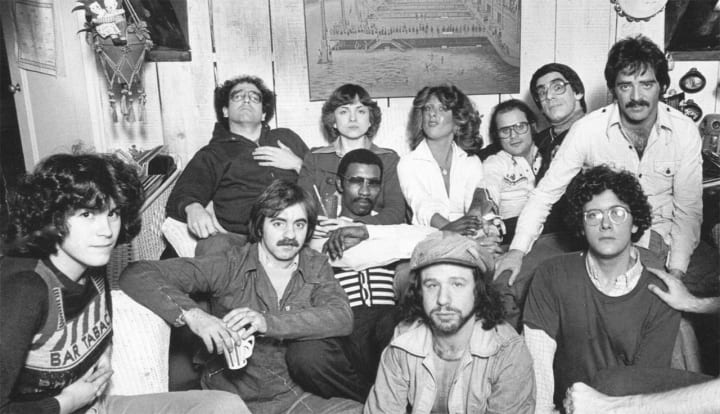
Larry David and friends, c. 1970's
"Imagine that you're in the middle of the tundra, there's nothing but white in every direction. You just happen to glance up and you see coming at you over the horizon-an Eskimo pimp. Twelve huskies pulling the shell of a red Eldorado. He's wearing a wide white beaver hat, gold sealskin suit, platform show shoes. "Hey Jack, you want a wo-man?," the pimp asks. "I got a lady here that gives good nose!” Underneath the laughter, Shaw whispers, "She takes NeoSynephrine for the disease....'
Shaw's routine continues with lines about the stoned munchies at BaskinRobbins and a bit about FDS timedrelease-fragrance-fresheners working at the wrong moment. He leaves them laughing, clapping, stomping and cheer1ng.
Next comes Ed Bluestone. Blue's cloak is the one-liner, and his nonplussed persona effectively sets the tone for his remarkable sense of humor. One hand moves into the pocket of his pale blue shirt while the other angles the mike towards his wry smile.
"Hello,” he begins in that slow Stang voice. “My sister’s wild—Vassar graduate-super sophisticated-used to drive with her legs crossed. Sexually a maniac, radical feminist—has an IUD made out of a snake with its mouth open.... I just bought a new stock and its down ten points already-Miners Tranquility Club-when guys are trapped in a mine shaft this company supplies them with F-M music.
"People try to make money on everything-even family get togethersthis couple invited me over last week to see their new baby. They had the baby inside a gum machine. Everybody had to keep buying gum until the kid was vis-i-ble.
"I have the worst doctor....My doctor runs his office like a supermarket-how many doctors have a cash register? He has a sign in the office that says, "Death Does Not Mean The End Of Your Financial Obligations.'
After his forty-five minute set kills the crowd, Blue stops for a glass of white whine at the bar, casual conversation with Chris and Judy and he's off. Plenty of time to make it to Catch while the crowd's still hungry. Elayne Boozler's on her way downtown from Catch. Most of the performers on the scene play both clubs, pinballing it from the Upper East Side to the theatre district.
Elayne Boozler, one of the circuit's most popular performers, takes the mike. After only three years, she's a veteran awaiting "overnight success. She performs, deftly utilizing movement, gestures and vocal modulations. Being able to approach sexual mores and hypocrisy differently than male comics ("Really, how could any woman sleep with a man without having had dinner and a movie first?”) means she doesn't have to rely on being a bitchy, fast talking, female.
As her set begins, Elayne checks out the crowd and wraps one arm around her head, rearranging her sweeping gold curls. "Sometimes I don't feel wanted,' she tells them. "Last night I was with a guy who faked premature ejaculation, now really, I didn't know what to do-I faked pregnancy....I read that psychologically girls are looking for their fathers when they go out-I can dig it—I can dig having an old man who gives me money and sleeps with my mother!'
When the audience misses one of her best ones-"do you ever find at night that men make demands you can't live up to?-they want you to scream you're the best while swearing you've never done this with anybody before’- and she ad-libs, "so the supermarket piece killed you and this gets nothing, boy, this crowd shops much more than it fucks....'
I spoke with Elayne Boozler late one night at Catch. She did four shows that night, two at Pip's in Brooklyn, one at the Improv. At around 2:30 a.m. sitting in a basement alcove, surrounded by sweating pipes and spooky sounds, Elayne has tired eyes. "There is really nothing happening in New York any more,' she says, "four killer shows tonight, okay. In Los Angeles it would have landed me 19 jobs tonight. Everybody knows it's dead here. CBS pulled their last show out of here because it's just too expensive. The expression, you've got to make your own fun' originated in California-if you have a good time it's because you forced it.' She's moving to California to follow the action. "I hate to leave these clubs-it's like leaving the womb.'
Elayne's observations on the social scene are so sharp, I wondered why she doesn't do more political material?
"You work so hard on political stuff and it's gone in a month. I think things are so heavy for everybody that nobody wants to go out there and remind them. I like comedy-nice bread and butter stuff. Like all my sex stuff, it's not castrating because I have no hostility towards guys behind it. I have a good time and I think that's why I can get away with the things I do. Men really sense that there's not a cunt under there....If they know you're pure underneath you can say anything you want.'
Why aren't there more women comics? "There aren't more women comics for the same reason most surgeons and politicians are men. No one ever thought of it before. I'm lucky because I was in the right place at the right time-really lucky. In another year it'll be perfect just when I'm starting to peak with all my stuff everything will be less chaotic for women. Plus, comedy's changed completely. I don't put myself down. It's not like I'm a loser, I can't get laid, I'm ugly I don't have to do that. Men don't have to do it anymore either. I just happened to be there, behind a new wave of conSciousness.''
About the Creator
George Gott
Writer & Social Media Editor for Jerrickmedia who is an avid reader of sci-fi and a fierce defender of women, minority, and LGBTQ rights.
Enjoyed the story? Support the Creator.
Subscribe for free to receive all their stories in your feed. You could also pledge your support or give them a one-off tip, letting them know you appreciate their work.


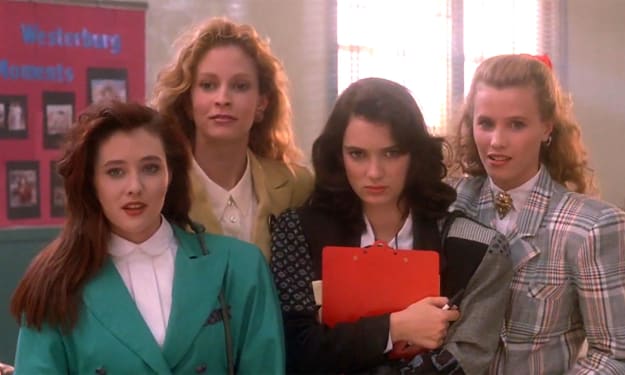



Comments
There are no comments for this story
Be the first to respond and start the conversation.